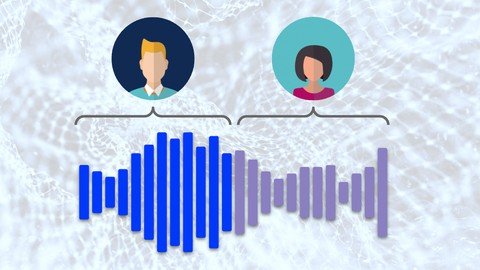
Published 06/2022
Genre: eLearning | MP4 | Video: h264, 1280x720 | Audio: AAC, 48.0 KHz
Language: English | Size: 1.19 GB | Duration: 13 lectures • 2h 52m
Speaker diarization: A journey from unsupervised to supervised approaches
What you'll learn
Basic concepts in speaker diarization
Commonly used algorithms in speaker diarization
State-of-the-art academic advances in speaker diarization
Coding examples of speaker diarization
Requirements
Basic knowledge in audio and speech processing
Basic knowledge in machine learning and neural networks
Basic programming in Python
Experience with speaker recognition
Description
This course is a tutorial on speaker diarization techniques.
Speaker diarization is an advanced topic in speech processing. It solves the problem "who spoke when", or "who spoke what". It is highly relevant with many other techniques, such as voice activity detection, speaker recognition, automatic speech recognition, speech separation, statistics, and deep learning. It has found various applications in numerous scenarios, such as automatic meeting transcript generation, medical record analysis, media indexing and retrieval, and 2nd pass speech recognition.
In this course, we will first go through the basic concepts and applications of speaker diarization, followed by the scoring and metrics. Then we will introduce the unsupervised methods in speaker diarization, starting with the commonly used modularized framework, followed by an introduction to clustering algorithms, with a focus on spectral clustering and its extensions. Next, we will talk about the problems with clustering algorithms, and introduce the supervised methods in speaker diarization. We will mainly talk about 4 supervised speaker diarization approaches, i.e. UIS-RNN, PIT/EEND, TS-VAD, and DNC. Finally, we will talk about the challenges and future research directions in speaker diarization.
For those who want to dive deep in speaker diarization, we also include video lectures from top speech conferences such as ICASSP and SLT by the instructors as additional learning materials.
Apart from the lecture videos, we have included small quizzes after each lecture to help you better understand the topics we have covered in the lecture.
This course would be a great fit for students, researchers, developers, or product managers who work on audio and speech processing.
Who this course is for
College and graduate students interested in audio and speech processing
Researchers in computer science or signal processing domains
Developers, system architects, and product managers for intelligent speech systems
Homepage
https://www.udemy.com/course/diarization/
https://rapidgator.net/file/99cef4977dfd45c2b15a2e16ced4e645/zbkas.A.Tutorial.on.Speaker.Diarization.part1.rar.html
https://rapidgator.net/file/7e39ab81a4fc6a91f22d94f09a85bdf5/zbkas.A.Tutorial.on.Speaker.Diarization.part2.rar.html
H4S
https://hot4share.com/4g6hkspsw14n/zbkas.A.Tutorial.on.Speaker.Diarization.part1.rar.html
https://hot4share.com/lsl8rjncyx5w/zbkas.A.Tutorial.on.Speaker.Diarization.part2.rar.html

https://nitro.download/view/DA1B55D2541BF0B/zbkas.A.Tutorial.on.Speaker.Diarization.part1.rar
https://nitro.download/view/7F3766EAD7B2B79/zbkas.A.Tutorial.on.Speaker.Diarization.part2.rar

https://uploadgig.com/file/download/027513fa62a0f08f/zbkas.A.Tutorial.on.Speaker.Diarization.part1.rar
https://uploadgig.com/file/download/c1b562b6Eb7A0268/zbkas.A.Tutorial.on.Speaker.Diarization.part2.rar
Links are Interchangeable - No Password - Single Extraction
